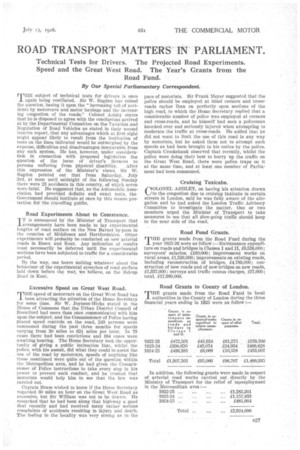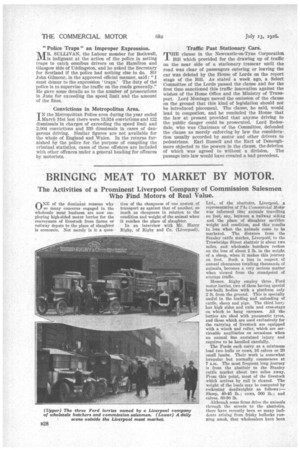ROAD TRANSPORT MATTERS - IN PARLIAMENT.
Page 11

Page 12

If you've noticed an error in this article please click here to report it so we can fix it.
Technical Tests for Drivers. The Projected Road Experiments. Speed and the Great West Road. The Year's Grants from the Road Fund.
By Our Special Parliamentary Correspondent.
THE subject of technical tests for drivers is once again being ventilated. Sir W. Sugden has raised the question, basing it upon the "increasing toll of accidents by motorcars and motor haulage and the increasing congestion of the roads." Colonel Ashley states that he is disposed to agree with the conclusions arrived at by the Departmental Committee on the Taxation and Regulation of Road Vehicles as stated in their second interim report, that any advantages which at first sight might appear likely to result from the institution of tests on the lines indicated would be outweighed by the expense, difficulties and disadvantages inseparable from any such system. He has, however, under consideration in connection with proposed legislation the questioa of the issue of driver's licences to
persons suffering from physical disability. After this expression of the Minister's views. Sir W. Sugden pointed out that from Saturday, July 3rd, at noon until midnight Of the following Sunday there were 23 accidents in this country, of which seven were fatal. He suggested that, as the Automobile Association had provided definite and exact tests, the Government should institute at once by this means protection for the travelling public.
Road Experiments About to Commence.
TT is announced by the Minister of Transport that
arrangernents have been made to lay experimental lengths of road surface on the New Barnet by-pass in the counties of Middlesex and Hertfordshire. Other experiments will probably be conducted on new arterial roads in Essex • and Kent. Any indication of results must necessarily • be deferred until the experimental sections have been subjected to traffic for a considerable period.
By the way, one hears nothing Whatever about the behaviour of the experimental stretches of road surface laid down before the war, we believe, on the Sideup Road in Kent.
Excessive Speed on Great West Road. Excessive Speed on Great West Road.
THE speed of motorcars on the Great West Road has been attracting the attention of the Home Secretary for some time. Sir W. Joynson-Hicks stated in the House of Commons that the Urban District Council of Brentford had more than once communicated with him upon the subject, and the Commissioner of Police having placed speed controls on the road, 243 persons were summoned during the past three months for speeds varying from 30 miles to 62-i miles per hour. In 79 cases there had been convictions and 164 cases were awaiting hearing. The Home Secretary took the opportunity of giving a public intimation that, whilst the police, with his assent, did what they could to assist the use of the road by motorcars, speeds of anything like those mentioned were quite out of the question within the Metropolitan area, and be had given the Commissioner of Police instructions to take every step in his power to prevent such conduct, and he trusted that motorists would help him to see that the law was carried out.
Captain Brass wished to know if the Horne Secretary regarded 30 miles an hour on the Great West Road as excessive, but Sir William was not to be drawn. He remarked that he had been along that highway a guod deal recently and had received many rather serious complaints of accidents resulting in injury and death. The feeling in the locality was very strong as to the pace of motorists. Sir Frank Meyer suggested that the police should be employed at blind corners and crossroads rather than on perfectly open sections of the high road, to which the Home Secretary replied that a considerable number of police was employed at corners and cross-roads, and he himself had seen a policeman knocked over and seriously injured when attempting to moderate the traffic at cross-roads. He added that he did not want to limit the use of this road in any way by motorists, but he asked them not to attempt such speeds as had been brought to his notice by the police. Captain Crookshank observed that recently, whilst the police were doing their best to hurry up the traffic on the Great West Road, there were police traps on it at the same time, and at least one member of Parliament had been summoned.
Cruising Taxicabs.
COLONEL ASHLEY, on having his attention drawn to the congestion due to cruising taxicabs in certain streets in London, said he was fully aware of the allegation and he had asked the London Traffic Advisory Committee to investigate the matter. One or two members urged the Minister of Transport to take measures to see that all slow-going traffic should keep to the near side of the road.
Road Fund Grants.
THE grants made from the Road Fund during the year 1925-26 were as follow :—Maintenance expenditure on roads and bridges in Classes I and II, £9,526,000; surveyors' salaries, 1160,000; improvement works on rural areas, £1,526,000; improvements on existing roads, including reconstruction of bridges, £4,783,000; construction of new roads and of new bridges on new roads, £1,337,000; surveys and traffic census charges, 157,000; total, £17,389,000.
Road Grants to County of London.
THEgrants made from the Road Fund to local authorities in the County of London during the three financial years ending in 1925 were as follow :—
In addition, the following grants were made in respect of arterial road works carried out directly by the Ministry of Transport for the relief of unemployment In the Metropolitan area :—
"Police Traps" an Improper Expression.
SULLIVAN, the Labour member for Bothwell, _MIAs indignant at the action of the police in setting traps to catch omnibus drivers on the Hamilton and Glasgow side of Uddingston, and he asked the Secretary for Scotland if the police had nothing else to do. Sir John Gilmour, in the approved official manner, said : "1 must demur to the expression 'traps.' The duty of the police is to supervise the traffic on the roads generally." He gave some details as to the number of prosecutions in June for exceeding the speed limit and the amount of the fines.
Convictions in Metropolitan Area.
IN the Metropolitan Police area during the year ended March 31st last there were 13,924 convictions and 122 dismissals in charges of exceeding the speed limit and 2,004 convictions and 339 dismissals in cases of dangerous driving. Similar figures are not available for the whole of England and Wales. In the returns furnished by the police for the purpose of compiling the criminal statistics, cases of these offences are included with other offences under a general heading for offences by motorists. Traffic Past Stationary Cars.
ITIHE clause in the Newcastle-on-Tyne Corporation Bill which provided for the drawing up of traffic on the near side of a stationary tramcar until the road was clear of passengers entering or leaving the car was deleted by the House of Lords on the report stage of the Bill. As stated a week ago, a Select Committee of the Lords passed the clause and for the first time sanctioned this traffic innovation against the wishes of the Home Office and the Ministry of Transport. Lord Montagu moved the omission of the clause on the ground that this kind of legislation should not be introduced piecemeal. The clause, he said, would lead to congestion, and he reminded the House that the law at present provided that anyone driving to the public danger could be prosecuted. Lord Reddale, who was Chairman of the Committee, defended the clause as merely enforcing by law the consideration usually accorded by motor and other drivers to pedestrians. Earl Russell and the Earl of Donoughmore objected to the powers in the clause, the deletion of which was agreed to without a division. The passage into law would have created a bad precedent.






























